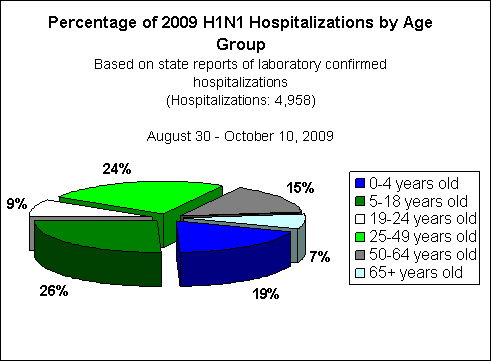
Photo courtesy of www.cdc.gov
The 2009 H1N1 virus conveys both panic and uncertainty among the public much more than it does knowledge and awareness about methods to boost your immunity.
The Centers for Disease Control and Prevention indicate that influenza activity remains high in the United States.
"The total influenza hospitalization rates for laboratory-confirmed influenza are higher than expected for this time of year for adults and children. And for children 5-17 and adults 18-49 years of age, hospitalization rates from April-September 2009 exceeded average flu season rates (October through April)," according to a CDC report.
Nationally, 19 flu-related pediatric deaths were reported last week; 16 of these deaths were confirmed 2009 H1N1 and three were subtype influenza A and likely to be 2009 H1N1. A total 76 laboratory-confirmed 2009 H1N1 pediatric deaths have been reported to the CDC since April 2009, according to CDC statistics.
It is important to understand that you may act upon plenty of no-need-for-prescription methods that will assist you in strengthening your immune system. A stronger immune system will not necessarily prevent the H1N1 virus from striking, but it will at least lessen the severity and the impact the virus could have on you physically.
Better hygiene is a great method to adopt, for it will reduce the amount of germs that individuals can spread from one person to another through direct contact. CDC reports suggest that, "If you don't have a tissue to cover your mouth when you sneeze, you should cough or sneeze into your elbow or shoulder, not into your hands."
Walgreen's Registered Pharmacist Carey Ford said, "There's nothing really we can do right about now…just cover your sneeze, cough and wash your hands constantly."
The inclusion of alcohol-based soaps or hand wipes are good choices as far as hand sanitation is concerned.
A balanced diet also plays a key role in determining the strength of every individual's immune system. The intake of proper and appropriate foods is essential to enhance your immunity. Drinking the recommended eight glasses of water per day goes hand in hand with sustaining a healthy, balanced diet.
How do I know if I have the flu?
You may have the flu if you have these symptoms:
- Fever Headache
- Cough Chills
- Sore Throat Fatigue
- Runny/Stuffy Nose Diarrhea
- Body Aches Vomiting
If you are experiencing several of these symptoms, the CDC advises that you stay home except to seek medical treatment.
Palo Alto College Nurse Dahlia "Dolly" Rosas said, "Following a good healthy diet, using the food pyramid as a guide would be good…get in fruits, vegetables and Vitamin C…always emphasizing your fruits and vegetables."
A few great sources of Vitamin C are oranges, broccoli, tomatoes, mangos, papaya, peppers, jicama, potatoes, kiwi, berries, avocado and garlic.
Sleep deprivation will most definitely have immediate negative effects that will instantly weaken your body's immunity. Most professionals recommend at least eight hours of sleep each night as a way to build natural immunities against all kinds of illnesses, such as the flu.
Rosas said, "Your body needs the rest and recuperation for healing and cellular repair."
However, sleep is hard to come by for many Palo Alto students. Graphic Arts Major Miguel Torres said, "My sleep time varies, some days about six hours." The CDC recommends seven to nine hours per night to stay healthy.
In addition to getting enough sleep each night for the body's energy and strength restoration, incorporate stress-releasing activities into your way of life, such as reading and all forms of exercise.
According to the CDC, 27 states are reporting widespread influenza activity at this time. They are Alabama, Alaska, Arizona, Arkansas, California, Colorado, Delaware, Florida, Georgia, Illinois, Indiana, Kansas, Kentucky, Louisiana, Maryland, Minnesota, Mississippi, New Mexico, North Carolina, Ohio, Oklahoma, Pennsylvania, Texas, Tennessee, Virginia, Washington and Wyoming.The worst method to follow is to ignore the H1N1 virus altogether, because serious consequences could derive from this kind of negligence.
"I am interested in the idea of the H1N1 virus, but the media has done too much hype about it," Torres said.
"A lot of speculation is made of a massive epidemic of a flu coming in this year, but you just have to wait and see if it will come in this year or next year as a more prevalent virus. I am not getting vaccinated. I do not feel like it is going to help!
